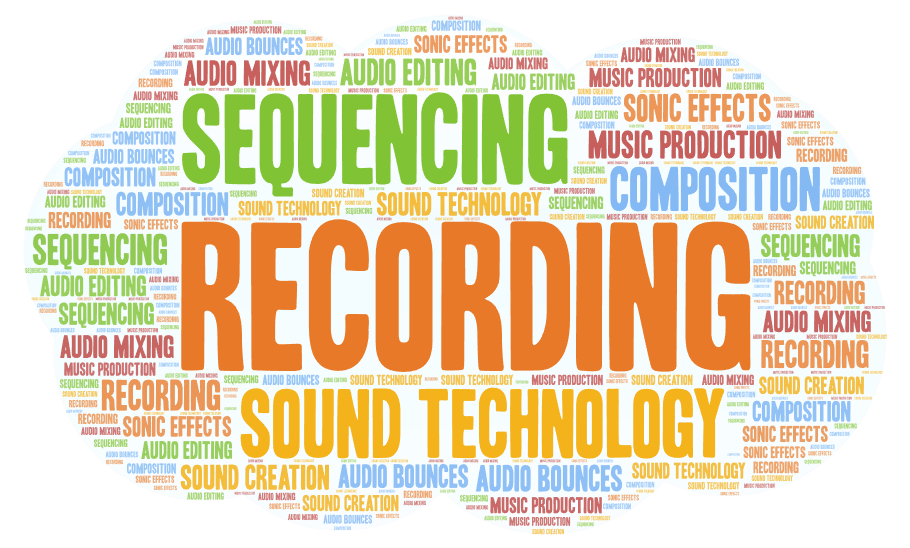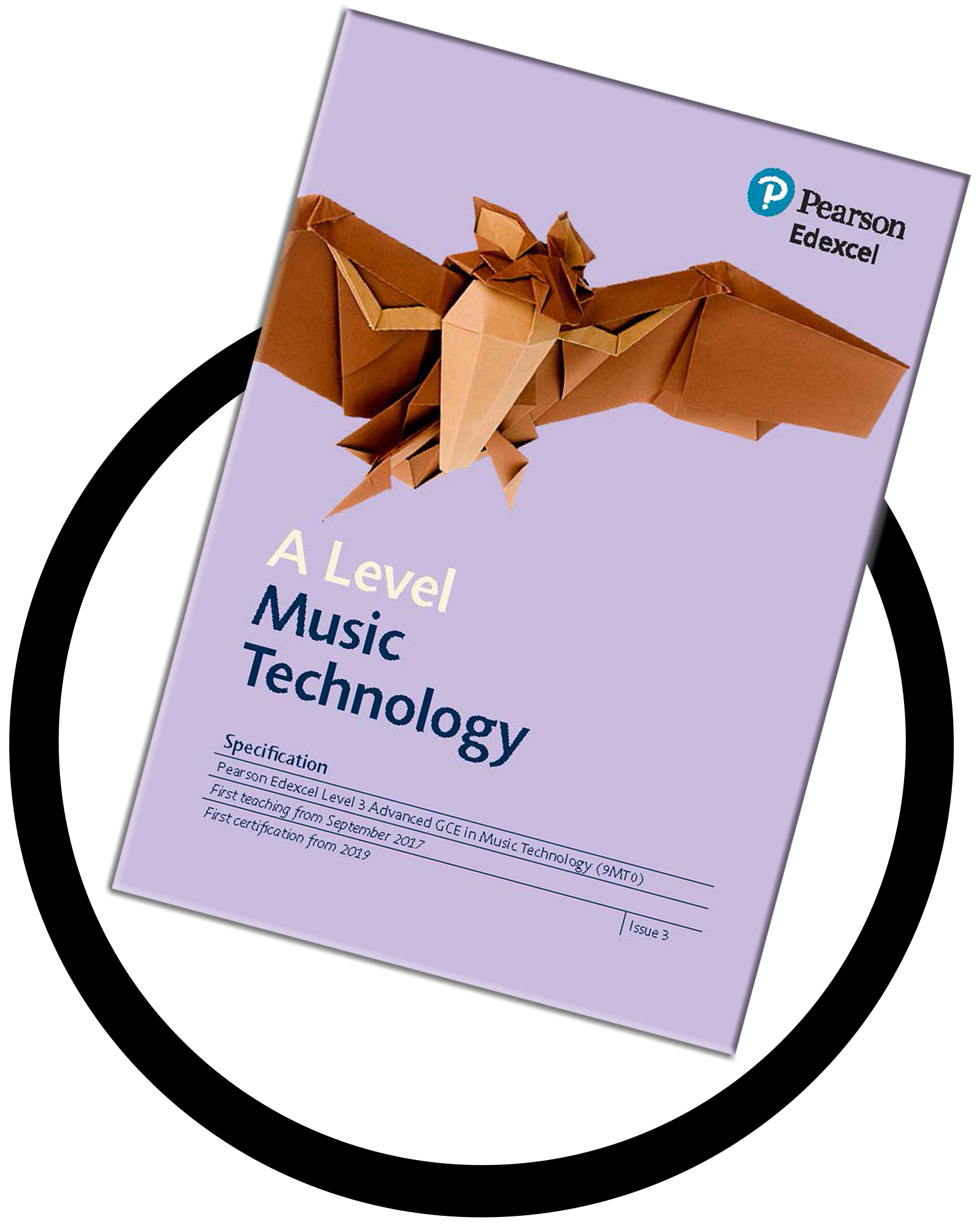A Level Music Technology
Why should I study A Level Music Technology?
![]()
Music courses encourage students to explore diverse styles of music, and allow them to develop their strengths and interests to provide access to music-related careers and higher education courses.
A Level Music Technology involves a wide range of skills - analytical, creative, logical, technological, communicative and aesthetic. The aim of this course is to extend the skills, knowledge and understanding needed to communicate through music and take part in music-making. The course introduces you to equipment, methods and working practices which are used in a range of industry situations and further education, and it mixes well with a wide range of other subjects.
We have a state-of-the-art recording studio with separate live room and control room. We use PCs with Cubase software for all our recording and sequencing work.
Studying this subject will enable you to:
- Understand the principles of sound and audio technology and how they are used in creative and professional practice.
- Understand a wide range of recording and production techniques and how they are used in practice for both corrective and creative purposes.
- Develop recording skills to demonstrate an understanding of sound and its capture and the skills to create and manipulate sound in imaginative and creative ways.
- Develop skills in critical and analytical listening to evaluate the use of sound and audio technology in your own and others’ work.
Course Specification

This course comprises four components, which are described below.
Component 1: Recording
Students will develop the skills to capture and manipulate sounds in corrective and creative ways in order to communicate effectively with listeners.
They will use technology to explore a range of techniques for capturing, editing and manipulating sound which will help them understand the impact of music technology on creative processes in the studio. They will then produce a completed mix.
Component 2: Technology-based Composition
Students will develop the skills to create and manipulate sounds in imaginative and creative ways in order to communicate effectively with listeners.
Students will use technology to explore a range of techniques for developing ideas. They will then turn their ideas into completed technology-based compositions.
Component 3: Listening and analysing
This component gives students the opportunity to identify, analyse and evaluate a range of creative music production techniques, as applied to the unfamiliar commercial recordings supplied in the examination.
As well as identifying effects and their associated parameter settings, students will explain the principles behind the choice of the effects heard on each recording, and their sonic character, in a series of written responses.
Through the deconstruction and analysis of a final, commercial product, students will expand their knowledge of the recording and production practices associated with a number of historical eras.
Component 4: Producing and analysing
The production stages of sound creation, audio editing and mixing will be covered.
Students will work with unedited audio and MIDI materials that have been captured using microphone, DI and sequencing techniques. The examination will assess the ability to process and correct these materials using a range of production skills, culminating in a series of audio bounces/exports for individual instrumental/vocal parts, plus a final stereo mix.
Students will refine and combine pre-existing ‘ingredients’ of a mix to form a convincing final product. Students will also comment on sonic characteristics of the materials provided, interpreting the underlying theory associated with these as well as justifying decisions they have made in respect of selecting processes and parameters when undertaking the practical tasks
Examining Board Information
Board: Pearson Edexcel
Course Code: 9MTO
Click the image on the right to download the full course specification.
Widening Horizons




Widening Horizons
We seek to broaden your horizons through a range of enrichment opportunities beyond the classroom. These include classical concerts, theatre and music events, music performances in the community and at primary schools, and visits for ensembles within the community.
Do you have a passion for Music Technology?
Then follow your passion and choose A Level Music Technology. You will learn everything you need to create your own music, produce recordings, how to work with musicians, and develop a secure understanding of the technology behind sound recording and reproduction.
“Music can change the world, because it can change people.”
Music will enable you to demonstrate many skills which employers, colleges and universities will be looking for. It can also give you opportunities to travel, meet people and get the most out of life. A Level Music Technology provides a range of transferable skills that will provide a great foundation, whatever pathway you choose.
“Music produces a kind of pleasure which human nature cannot do without”
In the future, creativity is going to be one of the most important and in-demand skills at work (World Economic Forum.) When business leaders across the world were surveyed, they voted creativity as the most important workplace skill to help their businesses survive and grow. This means that subjects like Music are becoming even more important and relevant to young people to give you the chance to succeed – whatever your ambitions.
“Music is to the mind as air is to the body.”
Our department is a safe and happy place with a hive of activity, a space to reflect, work and enjoy the wider world of music. The staff are on hand to support you, eat cake and share our musical experiences with you. We are looking at developing a whole range of co-curricular activities over the coming years, including more trips and visits, possibly even a tour. You can boost your CV and UCAS statement by getting involved and running co-curricular activities as well!
“The only thing better than Music is more Music!”
Assessment Format
Component 1: Recording
This is a non-examined assessment. It is externally assessed. This component is worth 20% of the overall marks for this qualification.
Component 2: Technology-based composition
This is a non-examined assessment. It is externally assessed. This component is worth 20% of the overall marks for this qualification.
Component 3: Listening and Analysing
This is a written paper (1hr 30mins) assessing knowledge and understanding of recording and production techniques and principles. This component is worth 25% of the overall marks for this qualification.
Component 4: Producing and analysing
This is a written/practical paper (2 hrs 15 mins plus 10 minutes set–up time). This component is worth 35% of the overall marks for this qualification.
Course Entry Requirements
This course requires a Grade 5 or above in GCSE Music or proven prior musical experience including performing and/or music production and song writing.
Employability Skills
Employability Skills are essential skills, personal qualities and values that will enable you to thrive in any workplace. Along with good technical understanding and subject knowledge, employers often outline a set of skills that they want from an employee.
This course will help you to develop the following employability skills:
- Complex signal path design
- How to motivate others
- Exceptional attention to detail
- IT literacy
- Time management
- Analytical skills
- Creative problem-solving
Next Steps
Students can go on to degrees in Music, Musical Studies, Performance Studies, Music Education and Music Technology.
They can go onto a wide variety of careers including Teaching, Composing, Performing, Music Management, Recording Engineering, Music Therapy, Music Events Management, Composing for the Media, Music Copywriting, Sound Engineering, Location Sound Recording for film and TV, Sound Design, Music Production and more.
10 Possible Careers
- Audio Post-Production
- Composer (Film/TV/Video Game)
- Education
- Location sound engineer (Film/TV)
- Live Sound or Recording Engineer
- Mastering Engineer
- Music Producer
- Record Label
- Songwriter
- Sound Design (Film/TV/Video Game)
Student Profile: Charlie
 Charlie's subjects
Charlie's subjects
Art & Design (Photography)
A Level Film Studies
A Level Music
Working in the Music Industry is my ultimate goal, with the Film Industry being a backup. I’ve been involved in various concerts which have helped me develop as a musician and the members of the Music department have encouraged me to become more confident and have exposed me to many different types of music.








